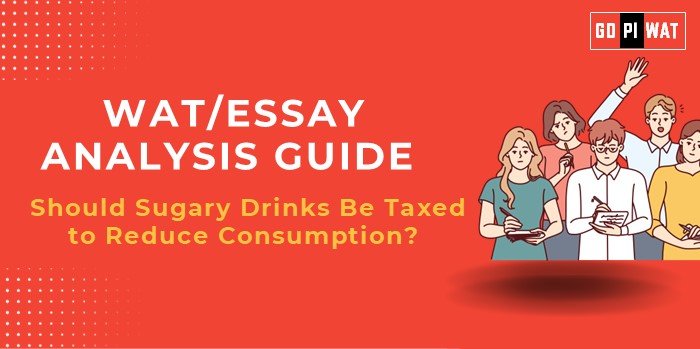📋 WAT/Essay Analysis Guide: Should Sugary Drinks Be Taxed to Reduce Consumption?
🌐 Understanding the Topic’s Importance
Taxing sugary drinks addresses a significant public health issue and exemplifies the role of policy in driving behavioral change. The topic highlights economic, social, and health dimensions critical for B-school discussions.
📝 Effective Planning and Writing
- ⏱️ Time Allocation:
- 📖 Planning: 5 minutes
- ✍️ Writing: 20 minutes
- 🔍 Reviewing: 5 minutes
- 📊 Key Preparation Tips:
- Highlight success stories like Mexico or the UK.
- Prepare counterarguments on economic fairness.
✨ Introduction Techniques for Essays
- ⚖️ Contrast Approach:
“While sugary drinks provide momentary refreshment, they contribute to long-term health crises, making taxation an urgent consideration.”
- 💡 Solution-Based Approach:
“Imposing taxes on sugary drinks could be the key to addressing rising obesity rates and reducing public healthcare costs.”
- 🌍 Global Perspective:
“From Mexico to the UK, sugar taxes have shown promising results in reducing sugar consumption.”
📚 Structuring the Essay Body
- 🏆 Achievements:
- Example: Mexico’s tax reduced consumption by 7.6%.
- Example: UK uses tax revenue for public health programs.
- ⚠️ Challenges:
- Issue: Regressive impact on low-income groups.
- Case Study: Denmark’s failed fat tax highlights pitfalls.
- 🌟 Future Outlook:
- Suggest: Pair taxation with subsidies for healthier alternatives.
- Goal: Achieve sustainable consumption patterns.
📄 Concluding Effectively
- ⚖️ Balanced Conclusion:
“While sugar taxes are effective, equitable implementation is essential to ensure fairness and maximize health benefits.”
- 🌍 Global Comparison Conclusion:
“Lessons from countries like Mexico and the UK show that sugar taxes work best as part of a broader public health strategy.”
🔍 Analyzing Successes and Shortcomings
– ⚠️ Ongoing Challenges: Economic equity; industry resistance.
– 🌍 Global Context: Mixed outcomes in different countries provide valuable lessons.
💡 Recommendations for Sustainable Progress
- 📈 Implement Complementary Measures: Pair taxation with subsidies for healthy foods.
- 📣 Enhance Public Awareness: Campaigns on sugar risks can build support for taxes.
- 💰 Ensure Transparent Revenue Use: Direct funds toward public health programs.
✍️ Sample Short Essays
- ⚖️ Balanced Perspective:
“Taxing sugary drinks is a practical measure to address rising obesity. However, ensuring the policy does not disproportionately burden low-income groups is essential.”
- 💡 Solution-Oriented:
“Sugary drink taxes can reduce consumption and fund public health programs, but their success depends on transparent implementation.”
- 🌍 Global Comparison:
“From Mexico to the UK, sugar taxes demonstrate success in reducing sugar consumption. However, lessons from Denmark caution against ignoring public sentiment.”


